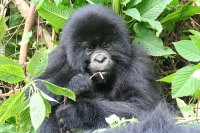Visit worldtravels.com for the full guide to Rwanda. Build a complete Rwanda travel guide and email to your clients - sign up for a trial subscription of World Travels Pro.
Rwanda

'Land of a Thousand Hills' ( Pays de Mille Collines) as it is popularly known, Rwanda is a small, verdant country in central Africa, the beautiful rolling landscape dotted with tea plantations, rugged mountains and towering volcanoes, with the shimmering Lake Kivu in the west.
Today Rwanda focuses mainly on ecotourism, being a nature lover's paradise and home to the world's largest population of mountain gorillas within the Volcanoes National Park. Gorilla tracking is the number one tourist attraction in the country, the critical nature of the plight of these endangered animals having been brought to international attention by the film Gorillas in the Mist, shot on location in the Virungas. Nyungwe Forest National Park is home to a large number of smaller primates, as well as more than 275 bird species, while Akagera National Park is big game country where herds of elephants and buffalo, lions, hippos and plains animals inhabit the archetypal African savannah landscape set among a web of swamps and lakes. The waters of Lake Kivu are enclosed by green terraced hills that give way to beaches, inlets and the resort towns of Gisenyi, Kibuye and Cyangugu.
Rwanda's past does not paint as an attractive picture, however, the legacy of almost 60 years of sporadic fighting having taken its toll on most of the population. The horrific genocide of about 800,000 Rwandans in the space of just over three months shocked the international media in 1994, sparked by a long-standing ethnic tension between the minority Tutsis and the Hutus. Since then, Rwanda has had to work hard to raise awareness of itself as an unspoilt, scenically stunning destination that is rich in culture and wildlife, boasting fine food and one of the friendliest welcomes in Africa, and is showing rapid signs of development and worldwide interest of a positive nature.
The rapidly growing city of Kigali, situated at Rwanda's geographical heart, is not only the capital but also the country's most important business centre and the main point of entry.
Climate
Rwanda experiences a pleasant, tropical highland climate with temperatures that vary depending on altitude, but vary little from month to month in the same location. There are two wet seasons and two dry seasons; a long and a short one. The wettest time of year is between March and May, while the driest months are July to September. There is also rain between October and November. Temperatures rarely go above 86°F (30°C) during the day or drop below 59°F (15°C), except on the upper slopes of the Virunga Mountains where frosty conditions are possible.
Money
The official currency is the Rwanda franc (RWF), which is divided into 100 centimes. The US dollar is the hard currency of preference; travellers cheques are difficult to exchange, even in the capital. Credit cards are only accepted at the major hotels in Kigali.
Passport Visa
Passport and/or passport replacing documents must be valid on arrival. It is highly recommended that passports have at least six months validity remaining after your intended date of departure from your travel destination. Immigration officials often apply different rules to those stated by travel agents and official sources.
Entry Requirements
- US nationals require a valid passport on arrival but no visa for a stay of up to 90 days.
- UK nationals require a valid passport on arrival but no visa for a stay of up to 90 days.
- Canadians require a valid passport on arrival but no visa for a stay of up to 90 days.
- Australians require a passport and a visa for entry to Rwanda.
- South Africans require a valid passport on arrival but no visa for a stay of up to 90 days.
- Irish nationals require a passport and a visa for entry to Rwanda.
- New Zealand nationals require a passport and a visa for entry to Rwanda.
Health
There is a year-round risk of malaria throughout Rwanda and travellers are advised to take a course of prophylactics. A yellow fever certificate is required by all visitors and inoculation is also recommended. A hepatitis A vaccine is recommended as well as a polio booster for those who have not had one as an adult. Other health risks include meningitis and cholera. Bottled drinking water is available in all towns. Medical facilities are limited and medical supplies may be unavailable, although hospitals are located in all major towns. Comprehensive medical insurance is advised.
Embassy Consulates
- Rwanda Embassy, Washington DC, United States: +1 202 232 2882.
- Rwanda Embassy, London, United Kingdom (also responsible for Ireland): +44 (0)20 7224 9832.
- Rwanda High Commission, Ottawa, Canada: (613) 569 5420
- Rwanda Embassy, Tokyo, Japan (also responsible for Australia): +81 (0)3 5752 4255.
- Rwanda Embassy, Pretoria, South Africa: +27 (0)12 342 6536.
Foreign Embassies
- United States Embassy, Kigali: +250 596 400 ext 2606.
- British Embassy, Kigali: +250 252 556 000.
- Canadian High Commission, Nairobi, Kenya (also responsible for Rwanda): +254 (0)20 366 3000.
- Australian High Commission, Nairobi, Kenya (also responsible for Rwanda): +254 (0)20 427 7100.
- South African Embassy, Kigali: +250 252 551 300.
- Irish Embassy, Kampala, Uganda (also responsible for Rwanda): +256 (0)41 7713 000.







